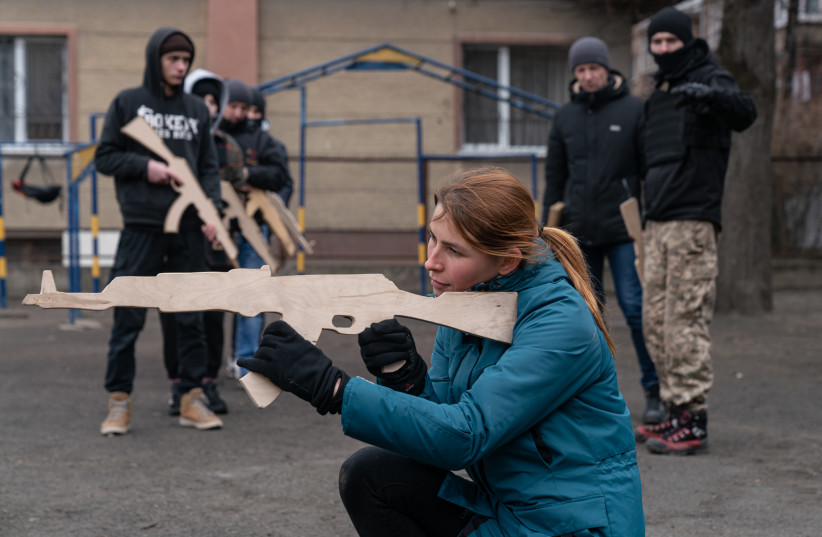Israel is working on more ways to help Ukraine, Prime Minister Naftali Bennett said in a press conference with German Chancellor Olaf Scholz in Jerusalem on Wednesday.
Asked if Israel will send weapons to Ukraine, Bennett said that Israel’s “policy is measured and responsible. We are thinking about all dimensions and considerations…We are doing what we can to help alleviate some of the pressures and consequences of this horrific situation.”
“We are helping Ukraine considerably,” he added, referring to the three planes with 100 tons of humanitarian aid Israel sent this week. On those planes were medicines, medical supplies, sleeping bags, tents and other items, an “almost unprecedented amount in Israel’s history,” as Bennett put it.
Read more on the Russia-Ukraine War:
“We are working on more things in this context,” the prime minister said.
Among those things would be to relax the standards for allowing Ukrainians to enter the country. Bennett said he spoke with Interior Minister Ayelet Shaked and they “agreed that our entire policy will be a broader one.”

Bennett said that “Israel stands with the Ukrainian people” and that Israelis, who have the unfortunate experience of being in many wars, identify with them.
But the prime minister continued to avoid any mention of Russia.
Scholz and Bennett both spoke of a need to bring an end to the hostilities and for the sides to come to the negotiating table.
“The responsibility on us as leaders is to do everything in order to stop the bloodshed and move what is happening as soon as possible from the battlefield to the negotiating rooms,” Bennett said. “It is not too late. We in Israel know of wars. Their price is high as we already see. Unfortunately, it can be much worse.”
“We are full of concern about the developments in the conflict,” he stated. “I want to say again that the attacks on the civilian population must stop. They must stop and we need to give diplomacy a chance.”
Ukrainian President Volodymyr Zelensky has repeatedly asked Israel to mediate with Russia, and Bennett brought up the idea to Russian President Vladimir Putin in the past as well as this week, to no avail.
Bennett called Scholz’s major shift of policy – sending weapons to Ukraine and increasing his country’s spending on defense – “courageous,” in response to a question on the matter.
“German military investment is sensitive given the history, but Germany today represents an anchor of stability and responsibility in Europe,” he said. “Israel represents an anchor of stability and responsibility in the Middle East. The new level of a bridge forming between Germany and Israel is good news for the world. It will bring more stability, more hope, more positivity in our regions and around the world.”
BENNETT ALSO spoke with Scholz about the nuclear negotiations with Iran in Vienna, in which Germany is one of the countries at the table.
“We have the responsibility to ensure that Iran will not have a nuclear weapon and will not have the opportunity to attain a nuclear weapon – not on our watch and not ever,” the prime minister said.
Any scenario in which Iran will be able to install large numbers of centrifuges is “unacceptable” to Israel, which expects its allies not to accept that situation, either, Bennett stated.
“We take Israel’s concerns seriously,” Scholz responded, “and we have to prevent Iran’s nuclear capabilities, because that is a threat to peace. We are working with our partners in the US.”
Scholz added that he still wants an agreement to be reached in Vienna.
“We should not postpone or suspend the negotiations. Now is the time to say yes to a good, wise deal,” he stated.
The German chancellor said it was important for him that a trip to Israel be one of his first on the job.
“The visit to Yad Vashem touched my heart and I want to emphasize Germany’s commitment to the State of Israel again,” he said. “You can count on Germany to stand strongly with Israel.”
The visit to Yad Vashem was a reminder of “the wound that is at the basis of the ties between Germany and Israel,” Bennett said. “Those ties are stronger than ever. Together we will deepen and broaden them.”
The leaders announced that Israel would hold an official strategic cooperation dialogue twice a year on security and diplomatic matters.
Scholz also said they spoke about Israel-EU relations, with the union being Israel’s largest trading partner.
In addition, the chancellor praised Israeli efforts to help improve the quality of life in the Palestinian Authority.
“Though there are no peace negotiations, people deserve to live in security and peace on both sides,” he stated. “A sustainable solution will be two states based on negotiations. That is a topic for a later date.”
